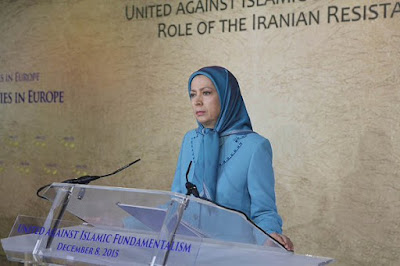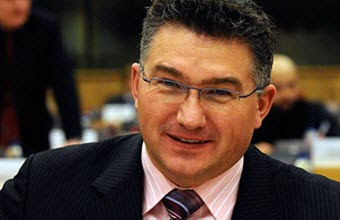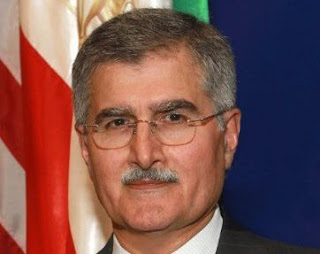 |
| مریم رجوی ریئس جمهور برگزیده مقاومت ایران |
Greetings
to all of you. Let me express my appreciation as well as those of PMOI members
in Camp Liberty and our compatriots in Iran to Senator Lieberman.
His
presence represents the American people’s friendship for the people of Iran and
a big front of high-ranking US personalities who advocate a correct Iran
policy, one that is devoid of appeasement of the religious dictatorship; he
also represents the friendship and respect among followers of all religions.
We
salute him.
I
would also like to welcome representatives of the Iranian communities in Europe.
These
communities include experts, artists, businessmen and those who represent the
true desires of the Iranian people for democracy and progress.
This
meeting on the eve of the International Human Rights Day is particularly
important for our people who live under one of the most oppressive regimes of
our time.
We
honor the International Human Rights Day by paying respect to all brave men and
courageous women in Iran and around the world who sacrificed their lives or
have risen up to bring human rights and democratic freedoms to oppressed
nations.
For
the people of Iran this day is a reminder of 120,000 martyrs of PMOI and other
victims of execution under religious fascism including 30,000 prisoners
massacred in 1988 and all the political prisoners executed in recent years, as
well as those slain in camps Ashraf and Liberty particularly the 24 freedom fighters
who lost their lives last month in a rocket attack at the behest of the
clerical regime.
Yes,
this day is a reminder that our people’s human rights are being stoned in Iran.
It
is a reminder that today the Iranian people do not have the right to live free
and have no safeguards against arbitrary arrests, torture and harassment.
It
reminds us that they are deprived of any comfort or security, that they do not
have the right to freely choose what they wear, that their right to freedom of
belief, conscience and religion has been taken away from them, that they are
deprived of the right to freely hold social gatherings; and the right to a free
election in order to establish the representative government they deserve.
Therefore,
the International Human Rights Day is a reminder that the Iranian nation is
entitled “as a last resort to rebellion against tyranny and oppression” to
overthrow the religious dictatorship ruling Iran and to replace it with a
government based on freedom, democracy and equality.
I
sincerely hail my fellow compatriots who have risen up these days outside Evin
Prison and other government centers to protest the arrests, executions and
stepped up pressure on political prisoners.
Yes,
we must earn our rights.
And
we must gain back our hijacked freedoms and human rights with our own struggle
and uprisings.
Unfortunately,
based on illegitimate considerations, particularly during the nuclear
negotiations and agreement with Tehran’s oppressive regime, Western governments
turned a blind eye on the flagrant violations of human rights in Iran including
the 2,000 executions under Rouhani.
After
signing the agreement, they sent large political and commercial delegations to
Iran one after the other to win a share of Iran’s market after sanctions are
lifted.
Since
the nuclear agreement in July 2015, the regime has hanged a large number of
prisoners in Iran and has intensified its warmongering and bloodshed throughout
the region.
We
call on Western governments to review their policy that has so far contributed
to instability in the region and reinforced the main threat to global peace and
security and to make their relations with the Iranian regime dependent on end
to executions and torture, and freedom of political prisoners.
Iran’s
clerical regime has been condemned 62 times so far by various United Nations
agencies for its gross violation of human rights in Iran.
In
addition, the regime and Khamenei himself, are directly responsible for the
massacre of 300,000 Syrians in the past four years and displacement of more
than half of the population; they are also directly responsible for the
genocide of Sunnis in Iraq by the Quds Force militias.
In
view of these crimes, it is unacceptable that the Iranian regime’s file has not
been referred to the UN Security Council.
It
is the responsibility of the UN Security Council to make the necessary
arrangements for prosecution of the leaders of the Iranian regime, particularly
Khamenei, as perpetrators of these crimes in an international court.
Dear
friends,
In
recent days, another terrorist attack in California shocked the world.
On
behalf of the Iranian Resistance, I condemn this crime and extend my
condolences to the families of the victims.
Like
the November 13 massacre in Paris, this shooting also took place under the
banner of Islam, while Islam is shocked by such barbarism.
Iran’s
mullahs massacred 30,000 political prisoners in 1988 under the name of Islam.
Those
who massacred unarmed people in concert halls and health centers are all of the
same ideology.
Indeed,
all religions have been sent to free mankind from all forms of oppression.
All
of us are sisters and brothers. We are all children of Abraham.
What
binds us is not hate, tyranny or oppression, but liberty, compassion and unity.
We
say there is no dispute between Shiites and Sunnis, Muslims and Christians, or
nations of the Middle East and West or their cultures.
The
dispute, however, is between ruling dictatorships and nations who seek freedom.
Anyone
who claims to be Muslim must stand up to Bashar Assad and Khamenei, and not
kill innocent people.
I
must repeat that the solution to this paradox is at the hands of the people of
the region to struggle against extremists particularly with an alternative that
is based on democratic and tolerant Islam.
Their
resolve and struggle will definitely put an end to the dictatorships that have
created and promoted fundamentalism.
Therefore
we warn everyone about the efforts of the Iranian regime and its allies to save
the Assad regime and cover up the consequences of Tehran’s failed strategy.
In
the past weeks, the governments of US, France and Turkey officially confirmed
that the Bashar Assad regime buys oil from Daesh.
On
the other hand, there is no doubt that Assad’s financial resources are always
restored by the Iranian regime.
So
the mullahs of Tehran through Bashar Assad finance the genocides by Daesh.
Yes,
Daesh has found the opportunity to grow and expand with the support of Bashar
Assad, and it will not be destroyed with Assad in power.
This
calls for Western governments to adopt a policy that supports the desires of
the innocent people of Syria for a speedy overthrow of Bashar Assad, gives
substantial backing to the Free Army of Syria in its struggle against the
regime, and insists on the eviction of foreign troops, specifically the Iranian
Revolutionary Guards Corps (IRGC) from Syria and Iraq.
I
thank you all.






